Massimo Bottura leans forward, eyes alight and says it with a grin that feels half-conspiratorial, half-childlike: “I am cooking like a kid every day.”
Behind the Dish: Tortellini
At first it sounds like whimsy, the sort of line you might expect from a chef with Three MICHELIN Stars and a restaurant that has long perched at the very top of the global stage. But Bottura isn’t joking. After three decades of running Three-MICHELIN-Starred Osteria Francescana in Modena, Bottura measures success not by prestige but by play.
That sense of play began under his grandmother’s kitchen table, where he watched pasta sheets unfurl like magic carpets and folded tortellini with flour-dusted fingers too small to do anything but learn. Those afternoons became the grammar of his cooking: discipline threaded with delight, rigor softened by wonder. It is why his most celebrated dishes such as the crunchy part of a lasagna, a single perfect tortellino and the cheekily dropped lemon tart are never static monuments to tradition, but emotional detonations. They don’t just impress; they make you laugh, ache and remember.
Now, on the 30th anniversary of Francescana, Bottura is less interested in nostalgia than in possibility. To cook like a kid, he insists, is to keep playing, keep questioning, keep imagining new futures even when the world would rather you rest on your laurels.
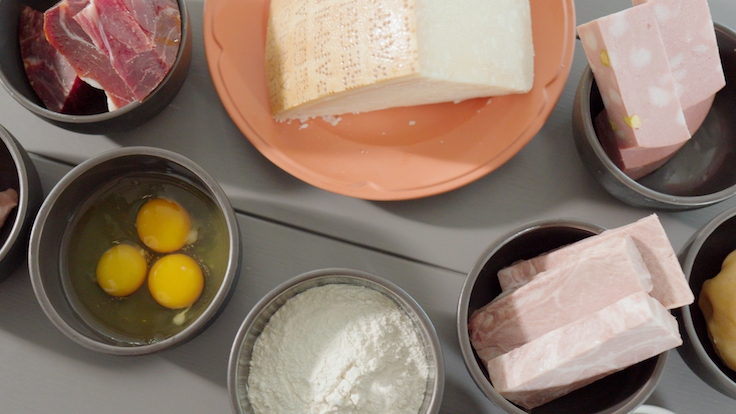
Ingredients for the Tortellini
Modena itself is a paradox: a city where the engines of Ferrari, Maserati and Ducati scream just beyond the cobblestones, while wheels of Parmigiano Reggiano age silently in cool, dark cellars. It is fast cars and slow food, industrial grit and Renaissance elegance. Growing up here meant learning that life could hold contradictions without cancelling them out.
To belong in Modena was to know how to fold a tortellino correctly. That first lesson in belonging: nimble fingers, watchful eyes, family gathered around a wooden table. This became the foundation of Bottura’s cooking. The boy under the table would grow into a chef who never stopped playing, never stopped believing that food is most powerful when it holds both discipline and delight.
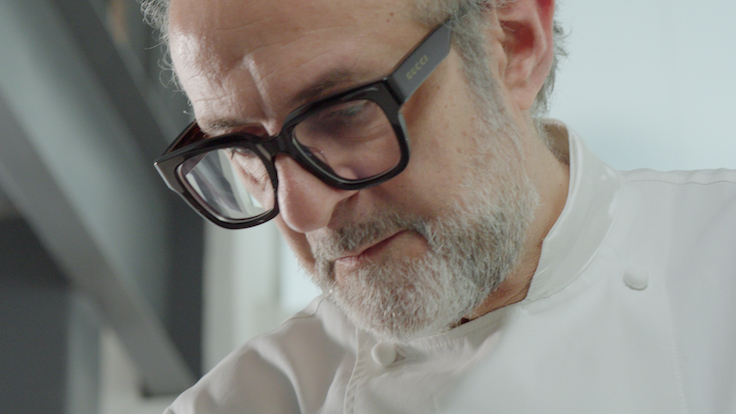
“Success is waking up, working all day, going to bed — and doing it all over again,” says Massimo Bottura.
For all his childlike joy, Bottura is quick to puncture the myth of chefs as rock stars. “Success,” he asserts, “is waking up, working all day, going to bed — and doing it all over again.” Behind the alchemy of Osteria Francescana is an almost monastic devotion: recipes tested, retested, picked apart, discarded, rebuilt.
“Talent is useless unless you feed it every day with hard work.”
But here’s the twist: it is precisely within that rigor that he preserves a child’s sense of wonder. The grind doesn’t flatten him; it sharpens him. Bottura finds joy in the repetition, in the endless “what if” questions, in the possibility that tomorrow’s service might yield something new. Where other chefs might calcify into self-parody after decades at the top, Bottura continues to treat the kitchen like a sandbox.
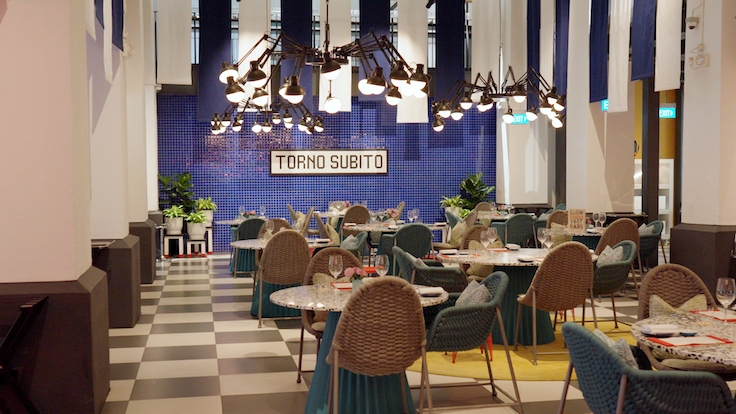
MICHELIN-Selected Torno Subito in Singapore
And it is in this spirit of play that he’s since exported across the globe, most vividly to Singapore, where his restaurant, Torno Subito, feels like stepping into a Fellini film. Pastel beach umbrellas, candy-colored booths and menus that wink and dazzle.
“The most important ingredient in any dish isn’t butter or salt but culture. Without it, food is decoration. With it, food becomes a message.”
Torno Subito is Bottura unbuttoned, channeling the operatic flavors of Emilia-Romagna, with Modena at its heart: the velvet salt of prosciutto, the crystalline snap of Parmigiano, balsamico dark as molasses and pastas that speak the language of family tables. It’s a reminder that sometimes the most radical act is simply to make people smile at the sight, smell and flavor of tasty food on a plate.
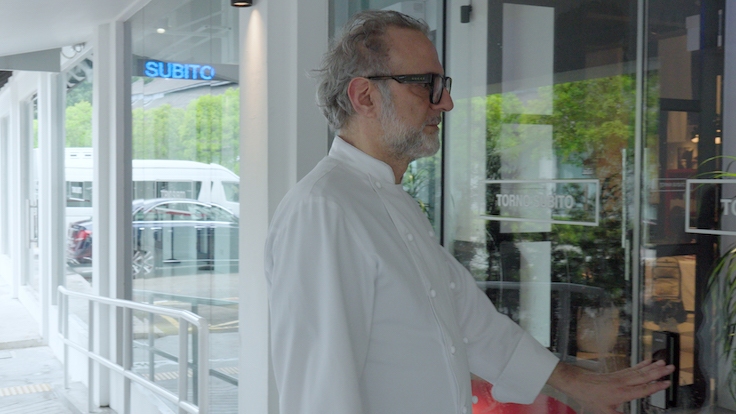
Bottura insists that cooking is always an act of love.
Food is the language of intimacy. A bowl of pasta can be a declaration of love, a pot of beans a peace treaty, a risotto a lullaby. Bottura insists that cooking is always an act of love, may it be within the grand walls of Osteria Francescana or in a soup kitchen where he ladles broth to the city’s most fragile souls.
“The intention is the same: to nourish not just bodies, but dignity. To feed is to say, ‘you matter’.”
To talk about “Italian food” as if it were one thing is to miss the point entirely. Italy is less a cuisine than a mosaic: thousands of micro-regions stacked together, each with its own dialect of flour, cheese, herbs and history. What unites it is not a dish, but a ritual. Italians cook to gather, to argue, to seduce, to mourn, to remind themselves who they are.
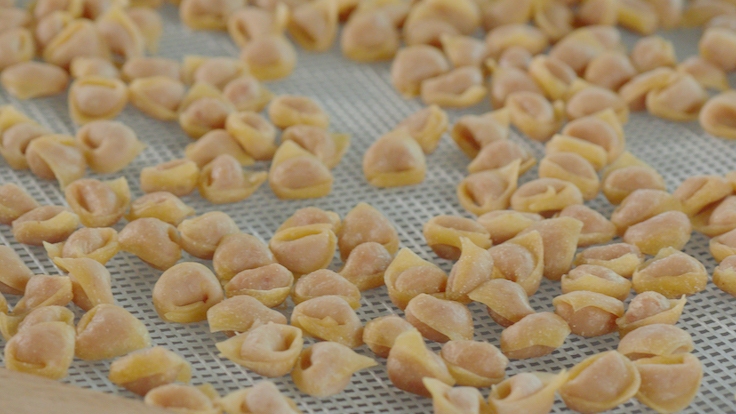
The rule is simple: the smaller the tortellino, the better.
And then there is tortellini.
As writer Justine Forelli once suggested, even if you lose your faith in God, you can still believe in tortellini.
Bottura speaks of them not as food but as a kind of secular sacrament, small pasta halos pinched shut by generations of hands. For Bottura’s experience making tortellini with his grandmother, the rule was simple: the smaller the tortellino, the better.
Tortellino: Modenese miniature stuffed pasta, creamy 36 months aged Parmigiano Reggiano sauce
The filling itself is a compact essay in Emilia-Romagna: Parmigiano Reggiano for umami, mortadella for richness, prosciutto for elegance, pork for depth. Sweetness, salt, fat and acid, all compressed into a bite the size of a fingernail.
“For me, tortellini is a container for ideas.”
For Bottura, to make tortellini is to perform a cultural ritual with those you hold near and dear. It is food, yes, but it is also a way of marking time. You fold, you fight, you gossip, you dream. And then, you eat.
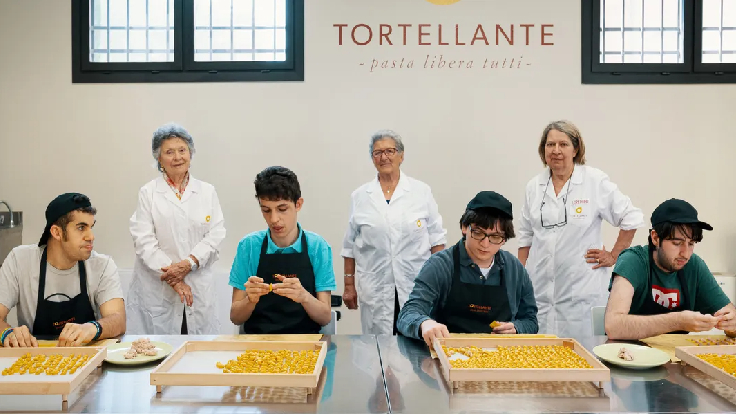
Emilia Panini, Candida Leonardi, and Loredana Grandi with students at Tortellante. Massimo Bottura’s son, Charlie, is on the left. (Photo: Maurizio Camagna)
A decade ago, Bottura watched his son Charlie, who has a genetic syndrome, make tortellini alongside classmates and two retired grandmothers. What began as an after-school activity became something far larger: the Tortellante project, now involving dozens of children, grandmothers and families.
As a boy, Bottura treated tortellini like toys, pinching dough around the filling with the earnest determination of play. As a chef, he treats them as teachers, reminding him that even the smallest gestures: a fold, a pinch, a bite, can carry the weight of centuries. Tortellini proves that food is never just sustenance. It is memory, identity and the simplest way to say: “this is where I come from.”
Bottura often says the future is not a place but a state of mind, and for him that state is childlike.
To look backward with nostalgia is to get stuck; to look backward with curiosity is to find the best of the past and carry it forward. His Crunchy Part of the Lasagna embodies this idea: a dish born not from reverence for tradition, but from a child’s squabble with his siblings over the crispiest corner of Sunday lunch.
This, Bottura insists, is the true future of food: not sterile innovation, not sentimental reenactments of the past, but cooking that feeds people with emotions as much as a dish’s flavors can deliver. Maybe, even more.
“Good food you may forget, but emotions last forever.”
His goal is to make adults feel like children again: surprised, delighted, unselfconscious, wide-eyed in front of a plate.
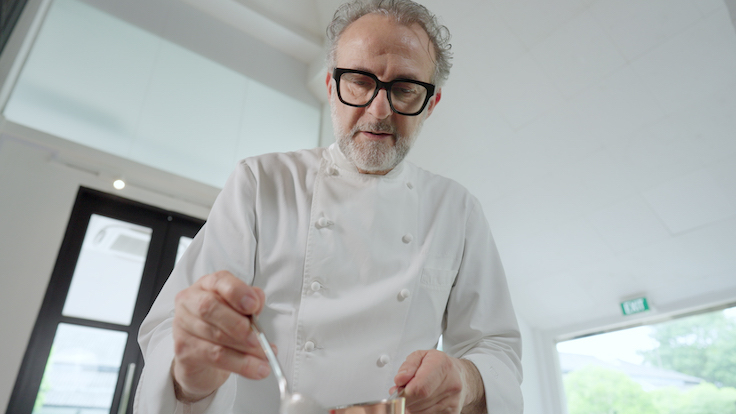
Bottura often says the future is not a place but a state of mind, and for him that state is childlike.
Thirty years on, Osteria Francescana is no longer just a restaurant. It is a family, a movement, a constellation of projects that stretches from Modena to Milan to Singapore and beyond. Yet, Bottura insists that at his core he is still that little boy under the kitchen table, eyes wide with wonder, playing with pasta.
To cook like a kid, he believes, is to never lose the essential things: joy, curiosity, courage. It is to fold tradition into the future, to turn mistakes into masterpieces, to find beauty where others see scraps. And perhaps that is Bottura’s greatest legacy: less about the accolades, but the reminder that the future of food lies in never forgetting how to play.

Written by
Mikka Wee
Based in Singapore, Mikka Wee is an Editor of the MICHELIN Guide and a relentless seeker of flavour, adventure, and the stories that bind them together. A curious wanderer, she roams the world with a hungry heart, believing that food is the purest expression of culture — vibrant, soulful, and best shared.

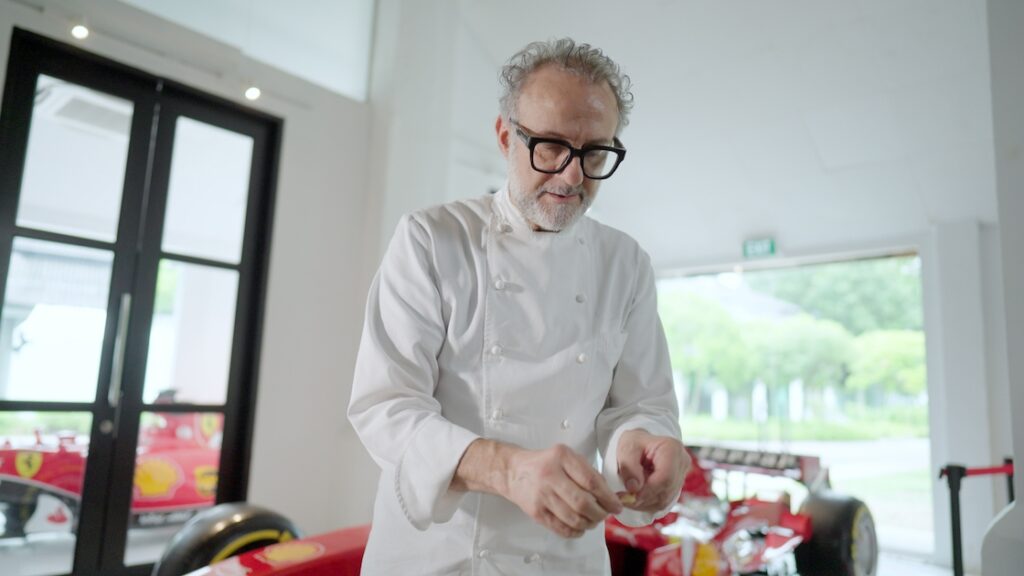
Dining and Cooking